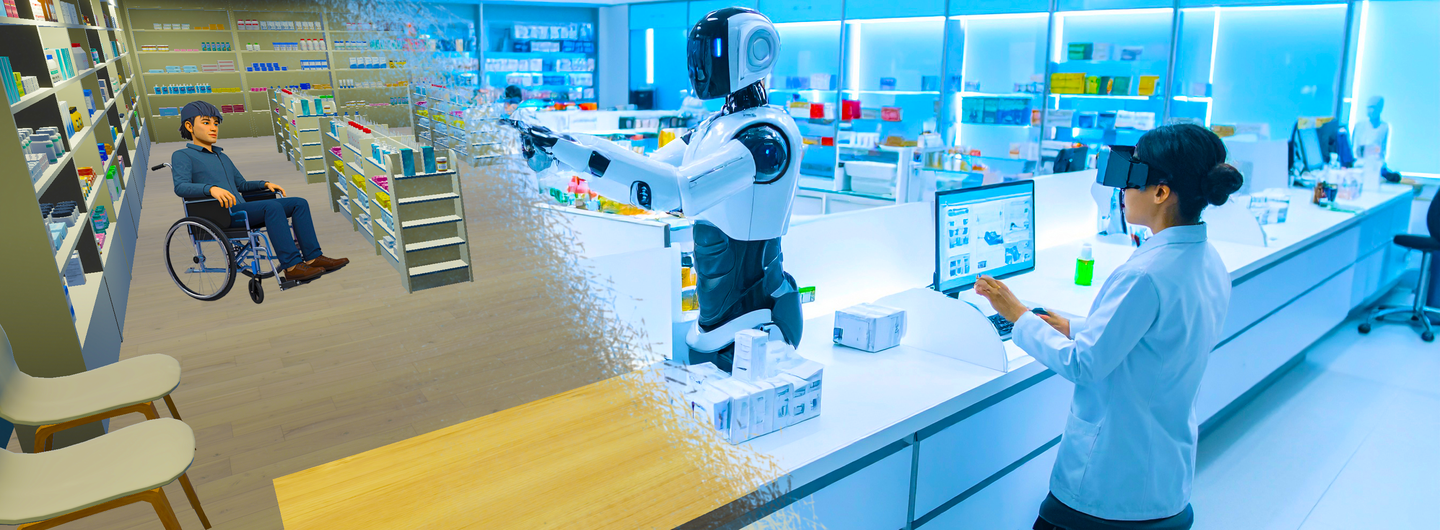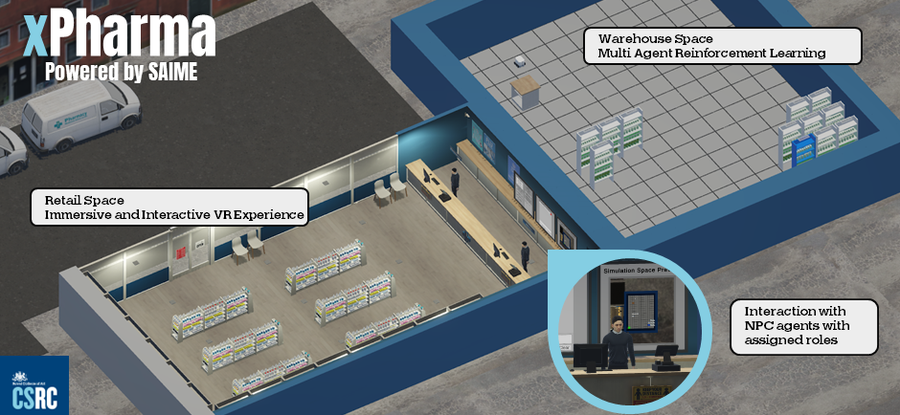
Spatial AI Modelling Emulator, or SAIME (pronounced 'Same'), is an AI-driven platform that converts intuitive user descriptions – whether text, speech, or sketch – into detailed 3D spatial representations, enabling non-technical users to optimise space according to their preferences.
“Describe the space, observe how it’s used, and rethink its potential.”
SAIME transforms intuitive inputs such as text, speech, sketches into detailed 3D spatial models, enabling non-technical users to optimise commercial and residential spaces efficiently and collaboratively.
It integrates best practices across design, construction, retail, and safety, offering no-code simulations that anticipate spatial needs and reduce costly post-occupancy corrections.
It supports large businesses and individuals by balancing regulatory compliance, operational efficiency, and personalised spatial solutions via a cyber-physical co-design platform.
It targets industries like construction, logistics, and retail, by providing real-time spatial simulations cut costs, reduce delays, and enhance customer engagement globally.
Key details
More information
The challenge
Designing and planning new commercial and residential spaces is a complex process, often slowed by the late discovery of flaws that require costly post-occupancy corrections. While immersive technologies like Virtual Reality offer some support by simulating interior environments, they are typically expensive and limited to early design stages.
According to Knight Frank’s 2023 Wealth Report, land costs remain exceptionally high in global megacities, which has led to a disregard for the efficient use of space, further limiting the availability of land for public use.
In Hong Kong, limited space has led to vertical living arrangements, with public housing averaging 13.8 square metres per person as of 2023. Retail spaces are also constrained, with rents on Hong Kong Island averaging 1,553 Hong Kong dollars per square metre in 2019.
What we did
We developed an AI-driven platform that converts user inputs such as text, speech, or sketches into detailed three-dimensional spatial models, enabling intuitive space optimisation without requiring technical expertise. Our work integrated industry standards from interior design, construction, retail, and health and safety to create a no-code simulation environment within a cyber-physical system. This environment allows real-time assessment of spatial designs on task performance, supporting both large enterprises and individual users in creating compliant, efficient, and personalised spaces.
The project leveraged immersive technologies, including virtual and augmented reality, to provide users with interactive and immersive visualisations of spatial layouts, enhancing decision-making and collaboration. Artificial intelligence played a crucial role by employing large language models to accurately understand and interpret human verbal descriptions of space, thereby alleviating variations in user input. Additionally, multi-agent reinforcement learning was utilised to optimise space usage dynamically, balancing multiple user behaviours and operational constraints.
Data was collected from Hong Kong and London, two cities with critical space shortages and high property prices, to inform realistic and impactful spatial models. Future research will focus on improving AI predictive accuracy, expanding sector-specific applications, integrating real-time data streams, and exploring sustainability metrics to enhance SAIME’s impact across industries further
Outputs
Publications
- Kargar, S.M., Yordanov, B., Harvey, C. & Asadipour, A., 2024. Emerging trends in realistic robotic simulations: A comprehensive systematic literature review. IEEE Access.
- Kargar, S.M., Lee, C.K.M., & Asadipour, A. (2025). Multi-Agent Reinforcement Learning for Multi-Robot Warehouse Automation in a 3D Environment Using Unity Game Engine. IET Cyber-Systems and Robotics. [Under review]
- Kargar, S.M., Kargar, S.M., Davies, J.J., Hameed, I., & Asadipour, A. (2025). Spatial AI Modelling Environment (SAIME): An Inclusive and Intuitive AI-Enabled Space Design and Optimisation Platform. Available at arxiv (pre-print)
- Hameed, I., Kargar, S.M., & Asadipour, A. (2025). Exploring Multi-Agent Reinforcement Learning Across Virtual Worlds in Unity & Nvidia Isaac Sim. Under review
Global Innovation Talks & Demos
- 2025 Mercedes Benz Tech Innovation, Stuttgart, Germany
- 2025 Universität Würzburg, Germany
- 2025 HTC Europe & HTC Corporation, RCA, London
- 2025 Sodexo Group, RCA, London
- 2024 Sony Interactive Entertainment, Sony, London & Tokyo
- 2024 London Office of Technology and Innovation, London
- 2023 Polytechnic University (PolyU), Hong Kong
- 2023 University of Science and Technology (UST), Hong Kong
Public Engagement and AI Panels
- 2024 Culture X AI, V&A, London
- 2024 London Design Festival
- 2023 Fashion x AI, The Mills Fabrica, London





